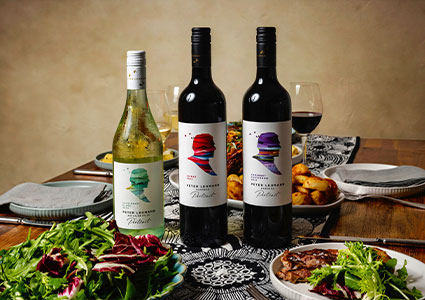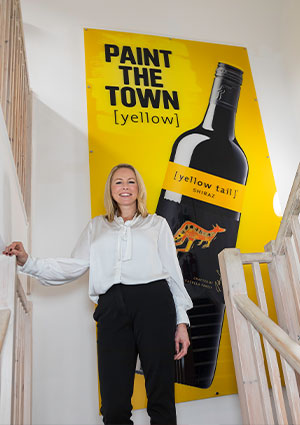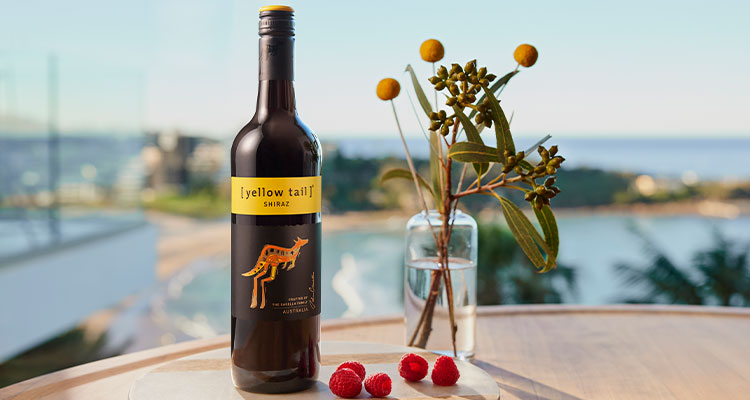From Sicilian roots to international success: inside Casella Family Brands’ journey
Based in New South Wales, Casella Family Brands (CFB) is Australia’s largest family-owned wine producer. Simon Lawson, Managing Director of Casella’s Europe division, CFBE, provides key insights into the company’s creation.
“Maria and Filippo Casella emigrated from Sicily in 1957, settling just outside Griffith in New South Wales in a town called Yenda. In 1969, the Casellas purchased a plot of land and established a winery. They produced relatively small quantities of wine until their son, John Casella, the current Managing Director and Owner of the business, returned to the winery in 1995, with the vision of creating a wine that was easy to find, easy to drink and easy to enjoy. Subsequently, CFB put itself on the map in 2001 with the launch of [yellow tail] in the US, which became an overnight success. As a result, the company grew rapidly, and now exports [yellow tail] to over 70 countries around the world. For the last seven years, [yellow tail] has been recognized as the World’s #1 Australian Wine Brand by IWSR. In 2014, Casella Family Brands acquired the Peter Lehmann winery in Barossa, followed by Brand’s Laira in Coonawarra at the end of 2015, Morris of Rutherglen in 2016, and Baileys of Glenrowan in 2017. By acquiring these wineries, Casella Family Brands has amassed a portfolio of regional gems that complement the hero [yellow tail] brand,” he begins.
tail] to over 70 countries around the world. For the last seven years, [yellow tail] has been recognized as the World’s #1 Australian Wine Brand by IWSR. In 2014, Casella Family Brands acquired the Peter Lehmann winery in Barossa, followed by Brand’s Laira in Coonawarra at the end of 2015, Morris of Rutherglen in 2016, and Baileys of Glenrowan in 2017. By acquiring these wineries, Casella Family Brands has amassed a portfolio of regional gems that complement the hero [yellow tail] brand,” he begins.
Robust relationships
As CFB’s most prominent brand in the UK, [yellow tail] has a history of its own, which Simon gladly tells us about. “Up until 2016, [yellow tail] was distributed in the UK and Europe by Percy Fox & Co., which was part of Diageo. That year, we decided to establish a Casella owned business in the UK to manage our operations in Europe. To achieve this, we brought over a team of people I had worked with at Percy Fox & Co. to set up the business, which started trading in July 2016. Our rationale was that [yellow tail] had grown big enough and had the potential to become a major brand in the UK market. Over the subsequent eight years, we quadrupled the scale of our UK business and now stand as one of the top wine brands in the UK market, exporting to around 30 countries across Europe,” he highlights.
CFBE’s success in the UK can be measured not only by the growth of the [yellow tail] brand but also by its winning company culture, which has been rewarded by The Sunday Times’ Best Places to Work in the UK award. Sarah Hornby, Head of Operations, explains the significance of this accolade. “The Sunday Times’ Best Places to Work award is a nationwide workplace survey that honors and celebrates the UK’s top employers. We were absolutely thrilled to receive this accolade, as we believe the success of our business is largely due to our people. The metrics assessed in the survey include reward and recognition, information sharing, empowerment, well-being, instilling pride, and job satisfaction. We are very proud to have scored in the 90s on all but one of those metrics.
“As employers, it is our job to attract the best talent by offering a great package and work-life balance. Once our people are employed with us, our leadership team works hard to retain them by treating them well and fostering a positive culture within our business. Moreover, we have a relatively flat organizational structure with little hierarchy and red tape, which allows us to make things happen quickly. We recognize that the definition of leadership and management has evolved since the pandemic, and we prioritize treating our people accordingly and truly getting to know them. This approach sets us apart and has contributed to our success in winning The Sunday Times’ Best Places to Work award,” she elaborates.

Likewise, CFBE strives to maintain robust relationships with its clients and supplier base, recognizing their impact on its growth. “Customer relationships are paramount to us, as they contribute to the development and growth of our brands. Being family owned is one of our core strengths, enabling us to take a long-term view on decisions without being distracted by short-term corporate initiatives. As everybody understands our viewpoints, we are highly consistent in our commercial approach and trading strategy, resulting in a predictable and reliable trading relationship. We prioritize building strong relationships with our customers to foster trust and mutual benefit. The resulting support from our customer base has contributed to the success of [yellow tail] as one of the leading brands in the UK. We measure the effectiveness of our customer relationships through the Advantage Group survey, where we have consistently ranked in the top two wine suppliers for the last six years,” says Simon.
Sarah adds: “Our success is also dependent on the relationships we have with our suppliers, and we exclusively work with partners who are leaders in their respective fields. Similarly, we work closely with our bottlers, warehouses, and freight forwarders to ensure they meet our high standards. We work with Encirc, a full-service provider that handles everything from making the glass all the way through to onward freight to our customers. Our suppliers enable us to provide quality service to our customers, which ultimately contributes to our success.”
Responsible production
Concluding our discussion, Simon emphasizes CFB’s steadfast commitment to sustainability. “It is becoming increasingly important for us to ensure that we produce responsibly, protecting our planet and empowering people. We have recently switched on one of the largest solar farms in the Australian beverage sector, which supplies approximately 35 percent of our main winery’s energy in clean electricity. This will offset 7800 tonnes of greenhouse gas emissions per year, which is equivalent to planting 325,000 trees. Additionally, in partnership with Hillebrand and Encirc, we are now shipping almost everything we produce in bulk to the UK and bottling it there, rather than back in Australia, significantly reducing our carbon footprint,” he ends.
